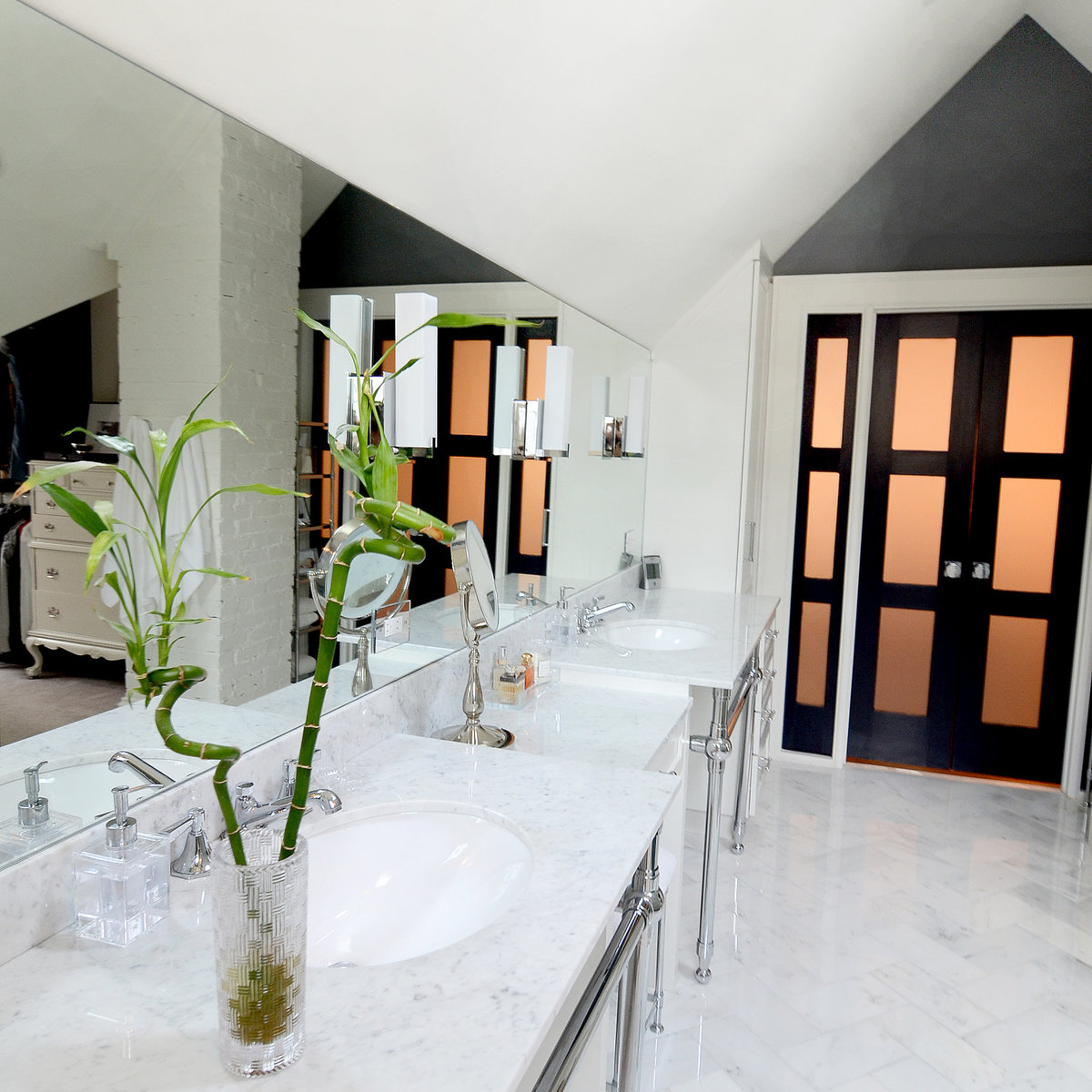Contractor Matt Hoots Brings Marine Pride to His Work
The Atlanta veteran shares tips for getting started and building integrity in the industry.

Matt Hoots built his first house in elementary school. It was a passive solar design structure crafted of cardboard, duct tape, and transparency paper. While serving as a U.S. Marine, he could not resist taking on some handyman work on the side. It’s no wonder he later attended Georgia Tech, started flipping houses and chose home building as his livelihood.
Today, he is a nationally recognized consultant who regularly blogs and creates YouTube videos reflecting his insights about residential home construction. With 25 years experience as the owner of SawHorse Inc., a residential custom home builder and renovator in Atlanta, he helped create the Earthcraft House Renovation program, and manages and builds showcase houses.
Hoots shares how his experience as a U.S. Marine shapes his business practices today, offers tips for newcomers and other veterans entering the construction industry, and discusses how he helps clients make beautiful and sustainable design choices that stand the test of time.

When Your Reputation Precedes You
Being a veteran of the Marine Corps pays off every day in business, especially when it comes to building a trustworthy reputation, Hoots says. People know what to expect based on your military service alone. “Clients immediately trust you because they know what your core values are,” he says.
“If you have those morals and you have those key values coming out of the military, then it's really easy going into construction,” Hoots adds. “It's just instead of shooting an M16, you're shooting a nail gun.”
For him, the transition to civilian life and starting a business was a smooth one. His work, and focus on green building, he says, carries that same integrity that is an integral part of the Marine Corps code. “We have integrity, we build well,” he says.
Going into Business Battle
Hoots draws parallels between military training and running a business. Marines are trained to have a plan before going into battle just as business owners have a mission statement. “With construction, you have to have a set of plans and specs. You decide who the team members are, you have your architect, your designer, and your builder the same way you've got your commanders,” he says.
The Marines also provide recruits the discipline of finishing what they started, an important attribute for contractors who need the stamina to see projects to the end. “Everyone gets taken care of, but the mission is most important,” he says. “When you make sure the client is taken care of it is the same kind of mentality,” he says.
“I don't think there's anything that doesn't necessarily transfer over to just being a small business owner - whether it's in construction or anything else - that isn't of value.”
Living the Civilian Life
Still, there are challenges for veterans as they adjust to business life once they have served their country.
The civilian world is different from being in the Marines because you can’t expect everyone to have the same high standards that you do, he says. “If you're only working with Marines and you're working with people with integrity, with certain values, you come out into the civilian world and you have the same expectations with people that you're working with, but it's not the same,” Hoots says.
One reason Hoots says he works for himself instead of seeking employment elsewhere is that it is difficult to find someone to work for who has the values and high standards he expects.
Nor does the business world provide the same safety net that military service offers. “There are performance standards (in the Marines) but if you make a mistake, you still have a job. If you make a mistake when you're your own boss in your own company, you are liable for that.”
Getting Started
Hoots says the best piece of advice he gives those starting out in the industry is to know thyself. “You have to know yourself and what you're expecting,” he says. Are you better at being your own boss, or do you want to work for someone else? “There's really no wrong answer,” he says.
He suggests starting with a trade you are passionate about. For those who want to become a general contractor, work for one first before starting your own business so you will be better prepared when you do, he advises. “The lessons that you can learn with them, it's on their dime,” he says. Once you're comfortable going on your own, it's pretty easy to start your own company as long as you have the right construction and business management tools, he says.
Using business management software makes it easier to run a company more efficiently, he says. He prefers Houzz Pro. “All the tools that you need if you're getting started, are there,” he says.
“You can save time and save money,” he says. “Obviously, you have to sell and if you are spending 30% of your time selling, 70% doing, that's pretty good, but if you're spending the inverse, then you're spending a lot of wasted time,” he says.
A management software helps you create a repeatable process so you are not staring at a blank document every time you make an estimate or draw up a contract. “If you do one estimate, say, for doing a deck or a garage and you've already estimated it in Houzz, well guess what? That could be cloned, that could be copied. You can update the pricing and you're just making a few modifications,” he says. “You know what the takeoffs are because you've already done the work.”
Pick a Specialty & Master It
Specialization is another lesson of the Marines that Hoots carried with him to the construction field. “During my time in the service, after completing the initial combat training, we underwent specialized training in our respective fields, whether infantry, administration, or culinary arts,” he says. “The same principle applies to the construction industry. As a general contractor, I chose to specialize in sustainable construction, honing my skills in this area and quickly becoming the leader in the market due to my focused approach,” Hoots says.
For those entering the construction industry with limited experience, it is crucial to distinguish yourself by mastering a few specific skills, he says. Doing so allows you to establish yourself as an expert in a particular sector. Becoming a specialist instead of remaining a generalist sets you apart from others and allows you to excel in your chosen field quicker.
Find the Best Clients
Hoots vets clients just as they vet him. “Not every lead needs to be converted to a client,” he says. “I'd rather have somebody that really wants to work with us that I'm spending the time with because you only have so many hours of the day.”
He recommends coming up with five or six questions to determine if a client is a good fit before devoting time to draw up an estimate that may go nowhere. “Potential clients don't pay the bills,” he says.
Instead of hiring a marketing team to find the right leads, he creates his own email campaigns using Houzz Pro software. “We had a 53% open rate, which is unheard of,” he says. With another service, the open rate was less than half that, he says.
“The cost of getting a lead from Houzz is much cheaper than putting an ad in a publication that's going to get recycled or is going to disappear after a certain period of time,” he says. And because Houzz has a community of millions of homeowners who opt in, it provides leads that are worth following, he says.
“If you're just running around putting flyers on telephone poles, I guarantee you that the types of leads that you're getting are definitely broader,” he says.
Design for the Future
Becoming a green builder was a natural choice he says because it is a higher quality approach to construction. “Once you know how to do things better, you don't want to go back to — if you've had gourmet coffee, you don't want to go back to gas station coffee,” he says. “The main thing about green building is you build better and you build with integrity.”
Building a home that is healthy to live in, and energy efficient results in happier clients and less liability or other issues, he says. Still, he cautions against letting green building trump beauty.
“Part of sustainability also has to do with aesthetics,” he says. “People tend to take care of things that are beautiful, that have good aesthetics. You could have a green structure and it's ugly - It's going to get torn down,” he says. He reminds clients that they are wise to make many sustainable choices, “but if we're only doing things for the environment and not for you, it's not going to work,” he says.
Sustainability also involves avoiding fleeting trends and instead choosing designs that remain relevant over the years. “When we're designing, we try to look at: Did this design look good 20 years ago? Does it look good now? Can it also look good 20 years from now? If the answer is yes, then it's a good design.”
Always Faithful
For veterans just coming out of the Marines or another branch of service, Hoots recommends using their bond with other vets to find a career. Reach out to other veterans in the fields you are interested in, he says.
“I know some businesses that are all veteran-owned,” he says. Services like police and firefighters also include a large number of veterans. Organizations know they will get quality workers when employing veterans, he says.
Hoots knows from experience.
“If your plumber was a Marine, and your electrician was in the Navy, and your roofer was in the Army - I've had that situation before - you know what to expect,” he says. “Their pride alone and their ego is going to make them want to do it correctly. It's a greater expectation based on your past,” he says.

Want advice delivered to your inbox?
Unlock industry insights and updates for contractors and design pros
By signing up, I agree to the Houzz Terms of Use and Privacy Policy and that Houzz may use my information to contact me about relevant content, products, and services.














Join the conversation by commenting or asking a question below. The Houzz team reads every single comment, and we’ll get back to you by email if you need us!